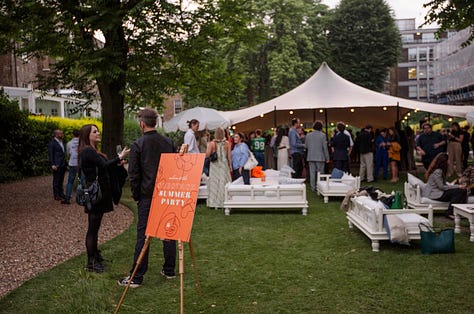A Golden Age of Letters
How to make one million dollars on Substack (*I don't, obviously)
Whenever I’m asked my advice about a career in journalism, mine is always the same – don’t do it, obviously! It’s not a viable industry, you won’t make anything like a decent salary compared to contemporaries, and you will end up bitter and twisted, just like me. At the very least you’ll probably leave to start a second career, finding yourself years behind as a result. (Anyway, I hope you enjoyed this inspiring speech – congratulations on your MAs in journalism.)
While I wouldn’t advise you to enter the media, I would suggest that you might become a man or woman of letters, which is a different thing altogether. In fact, while print journalism has been dying a prolonged death for two decades, now joined in its agonies by television, we live in a golden age of letters.
At the Substack summer party in Bloomsbury on Tuesday, I learned that there are now five million paid subscriptions on the platform globally, and 50 of its writers are making over $1 million a year. I assume they’re all in America and there are none of us Europoors on the list, but these are impressive numbers.



Substack is the leading platform for the renaissance in the republic of letters, making it much easier for writers to earn a living from the western world’s dwindling number of functionally literate people. Its growth continues unabated, and with good reason.
Writing on Substack has many advantages when compared to trying to pitch as a comment writer for newspapers or magazines, the obvious one being freedom. Writers write best about the things that interest them, but not obsess them (that often has the opposite effect). A good writer can make any subject worth reading, and independent journalism allows far more space for the eccentric and quirky subjects that fail to pitch successfully in the media.
Traditional comment journalism, in contrast, is about a ‘fit’. Commissioning editors are looking for a particular singer to suit the song, often related to a hook. A controversy is being discussed in the media, perhaps because a public figure has made the mistake of saying something true, and they want a particular face to offer a unique take.
For example, it’s obviously more powerful to have a writer from a minority background saying something critical of the race relations industry than to have me, one of a whole army of posh white men working in the media, making the same point. Similarly, on gender issues, it’s more interesting to have criticism of feminist conventional wisdom coming from a woman rather than yet another repulsive old gammon. It is much more ‘lived experience’-based, by its nature. Writers can break out of this typecasting, if they’re talented and interested in other subjects, but their value as a comment writer depends on supply and demand.
If this sounds like a complaint, the game is rigged in many other ways, and the arts, being poorly paid and far more network-based, is posher and whiter than the more competitive world of finance. Indeed, there are many ways in which women in journalism have it much worse – in particular the pressure to write about personal issues which sometimes veer into humiliation. The website will get clicks, and the writer will get a small fee, but it’s debatable whether it’s good for their careers, let alone their sense of wellbeing.
It’s very competitive, and badly paid, and will entail many years of poverty before you make a living. Most people can’t afford that, and this is the simple explanation for why this branch of the entertainment industry – like most others – is dominated by nepobabies and failsons (including myself).
As a columnist you are as much a creature of a publication as the manufactured pop singer is of the record label – you are the fit for whatever story the editor is currently obsessed with, and is trying to market. The comparison is not that far off, and journalistic copy is often so messy that it’s rewritten beyond recognition by some unsung hero on the comment desk, the equivalent of the anonymous middle-aged Swedish men who seem to write most pop songs.
As a person of letters, however, you can build your own audience; rather than being a plaything of Simon Cowell or Louis Walsh, you’re gigging at a succession of grimy pubs in north London. It may be slow, and it is almost certainly necessary to have a day job or another source of income, and you may give up to become an accountant. Yet a second career won’t harm your writing, and indeed, some of the most interesting people on this platform had non-journalistic careers; Rory Sutherland and Ian Leslie both came from the world of advertising, which gives them an insight into human psychology and a ready source of material and anecdotes.
While AI is making news reporting even more obsolete, the (wo)man of letters is relatively immune to automation because of the importance of parasocial relationships. Your readers have an even closer relationship with you as an independent writer than they do with a columnist, and that is what they pay for. I have parasocial relationships myself as a consumer. I take my favourite podcast, The Rest is History, with me when I’m travelling; whenever I’m staying in a hotel room, I always have Tom Holland and Dominic Sandbrook to keep me company.
There are downsides to being a person of letters, of course; a good editor, and I have worked with a couple of very good editors, hugely improves a writer’s copy, possessing an eagle eye for what stands out and taking out the self-indulgent flights of fancy. Editors also act as a check on the inevitable problem of audience capture, and a tendency towards ever more extreme and bizarre viewpoints.
This is an obvious risk, since opinions tend to cluster, and not entirely due to the typical personality profiles of conservatives, liberals and progressives. Tribalism leads people to align their views with the broader in-group, and they are often disappointed to find allies who defect.
Obviously, this is irrational, and there’s no logical reason why sympathies for, say, Israel or Palestine, align so well with support for gender critical and pro-trans positions respectively, yet they do. Small numbers of readers will see breaking the coalition as a betrayal, and indeed my paid subscriber numbers fell ever so slightly after criticising Donald Trump. (So his insane tariffs have made me poorer twice over.)
Audience capture is an individual risk, and yet early fears about independent journalism driving extremism – voiced by the, of course, totally disinterested traditional media – have proved false. Indeed, almost all the Substack millionaires seem to be centrists with very middle-of-the-road opinions, far more restrained than the rage bait frequently found in broadsheets.
The reason that very successful substacks tend to be moderate is perhaps because there is more long-term advantage to it. It is easier to capture the world’s attention by saying outrageous things which are controversial and unsourced, but it’s a short-term strategy that doesn’t pay off over long periods. Substack is not part of the attention economy, and in a world where the attention economy itself is over-saturated and competing for attention, that explains its popularity.



In many ways, the early 2020s has been a second Golden Age of Blogs. The first Golden Age of Blogs was in the late 2000s when the Internet really began to penetrate all aspects of life (with wireless connection) yet it wasn't as commercialized then. Google search actually took one to all sorts of fun and otherwise obscure blogs that today would be hard to reach due to all the big commercial sites showing up first (not to mention often having problematic views in the eyes of search engine programmers). DuckDuckGo still takes one to more interesting stuff occasionally though.
A big hearty "yes" to a sense in having a 'moderate' long-term strategy/absence of click-bait rage.
This is why I keep reading and keep (willingly) pay to read you Ed: everything you write, no matter the subject, is always well-written, balanced, and, above all, just very interesting.